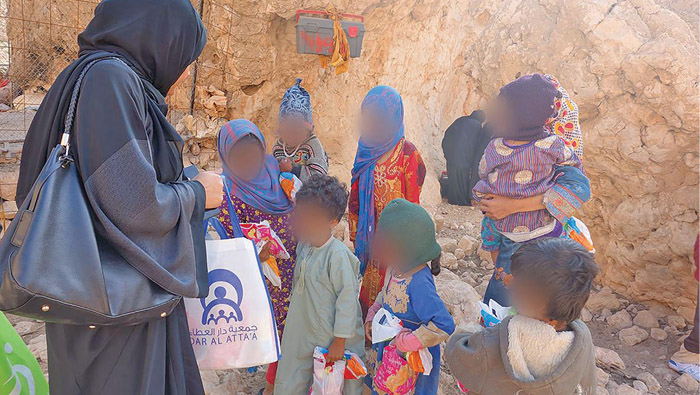
Muscat: Having already helped thousands of people in need both in Oman and overseas, Dar Al Atta’a plans to come to the aid of as many more people as they can.
They plan to do this by bringing in more charities under their wing to reach more people in Oman, as well as coordinate with the Oman Charity Organisation (OCO) – the Sultanate’s official international aid structure – to ensure that the aid they gather reaches those who need it the most.
Having recently returned from Bangladesh, where they were able to see first-hand the plight of the Rohingya refugees who fled Myanmar and are being looked after by several international aid agencies and the United Nations, Dar Al Atta’a collected more than OMR60,000 in international aid to help ease the situation the refugees find themselves in.
“We actually went to Bangladesh, where the Rohingya refugee camps are situated, to see for ourselves how bad the situation was and to see how we could help them,” said Shaza Abbas, one of the co-founders of Dar Al Atta’a, in an exclusive interview with the Times of Oman. “All of our international aid is sent through the OCO. They are the official representatives for all of Oman’s aid and they know exactly whom the aid is going to.
“People in Oman don’t know much about the OCO and what they do, because in typically Omani fashion, they don’t like to advertise what they do and they like to keep it low-key, and I love that they do it that way,” she added. “When we send aid, we also go back to the areas where the aid is being distributed so we know it is being used correctly and so we can follow up.”
That’s not the only foreign aid mission Dar Al Atta’a have committed themselves to at present: a medical lab is being set up in Galilee, Palestine, to help those living in the Palestinian Territories, some of whom don’t have access to the most basic of needs.
“We went to Jordan a while ago to help the Syrian refugees there, and while we were there, we decided to go to Palestine to see how we could help the people who live there as well,” said Abbas. “For them to get even the simplest medical tests done is a very difficult process because they have to often get clearances, which they are sometimes denied or take a lot of time to come through.”
“These are really simple medical tests we are talking about, for example, to prevent communicable diseases, or to help expecting mothers, so they are aware of what they need to do to stay well,” she added.
Abbas also shed light on Dar Al Atta’a activities in Yemen and Syria, where thousands of people have been rendered homeless or have been forced to flee the fighting and now find themselves refugees in their own countries.
“What really affected us in Yemen and Syria was the condition of the children in the refugee camps, because they are constantly forced to move from one place to another and their education is being interrupted and disrupted for what is really no fault of their own,” she revealed. “In Yemen, because they were our southern neighbours and so close to us, we collected food and clothes for those who had been affected by the war, but when we went to help those affected by the war in Syria, we wanted to do something that was more lasting, so we organised shelters for them, that had been donated to us.”
Closer to home, with Ramadan just around the corner, Abbas and her colleagues at Dar Al Atta’a want to encourage the spirit of giving both during and well after the Holy Month.
“Ramadan is really the month of giving, and I think it is an obligation for everyone who has more, to share it with the needy,” she explained. “During Ramadan, we will definitely have our iftar boxes, which we will be distributing to those who need them, but wherever possible, we will run this in collaboration with local mosques, so people can come, sit down and enjoy their food.”
“We also want to expand on the help we provide to people in the interiors,” added Abbas.
“Currently, we have three main programmes. Our Let’s Read programme encourages more children to take up reading, and we also have our Maktabati mobile library that goes around different cities and towns in Oman to encourage children to read. We also have an endeavour to build houses for needy, as well as one where doctors volunteer with us to provide their services in remote areas across the country, and we want to expand these services to those who need them.”